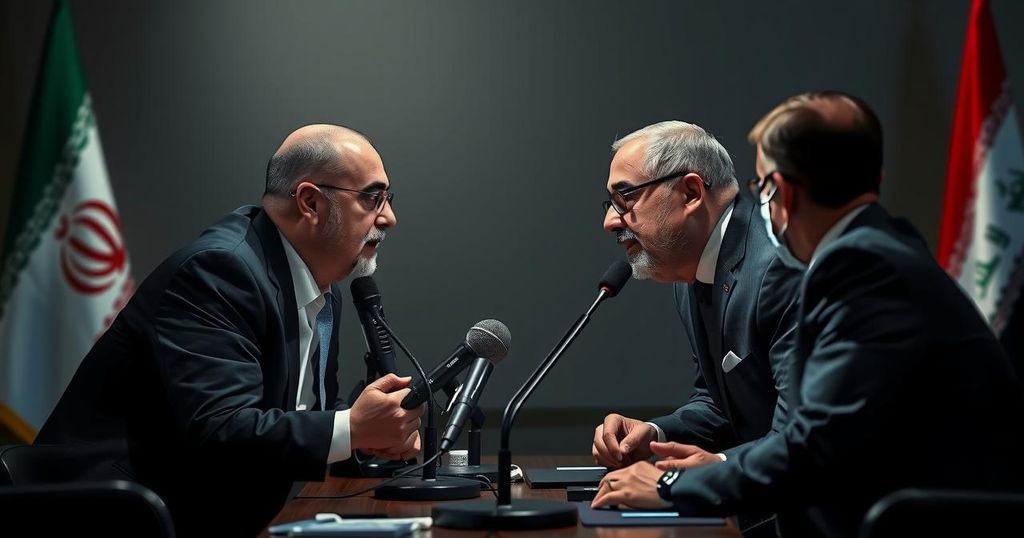Iranian Foreign Minister Abbas Araghchi met with Iraq’s National Security Advisor Qasim al-Araji, discussing security cooperation amid escalating tensions with Israel. The meetings coincide with ongoing diplomatic efforts between Iran and Iraq aimed at enhancing security ties. Iran seeks to address regional threats through collaboration with militias while pursuing broader diplomatic initiatives, notably regarding Syria. This illustrates Iran’s intensified outreach and influence in Iraq and the surrounding areas.
On a recent visit to Tehran, Iranian Foreign Minister Abbas Araghchi engaged in discussions with Iraq’s National Security Advisor Qasim al-Araji, signaling Iran’s intent to bolster its influence in Iraq through both diplomatic endeavors and military collaboration. Simultaneously, Ismail Qaani, head of the Quds Force, was reported to have also met with Araji, highlighting the coordinated approach of Iran’s Islamic Revolutionary Guard Corps (IRGC) in fostering stronger ties with Iraq. The timing of these discussions coincides with a joint Arab League and Islamic summit in Saudi Arabia and amid escalated tensions fueled by drone attacks from Iraqi militias on Israel. Araghchi emphasized the significance of security cooperation between Iran and Iraq, asserting that “We consider Iraq’s security as Iran’s security and we hope that with the full implementation of the security agreement, sustainable security would be established in the border areas of the two countries.” Alongside, Al-Araji reiterated Iraq’s position regarding Iran’s security, promising action should threats emerge against Iran from Iraqi territory. The two officials also discussed previous visits by Iranian officials to Iraq and the selection of broader agreement frameworks that aim to enhance economic relations through an established security pact, which includes provisions for disarming groups that pose threats to Iran. Simultaneously, reports indicate that Iran’s senior advisor Ali Asghar Khaji was participating in discussions in Astana, Kazakhstan, relevant to the ongoing situation in Syria, where Iran continues to frame Israel as a disruptor destabilizing the region. These developments reflect Iran’s multi-faceted strategy aimed at consolidating its influence across regional affiliations and addressing perceived aggressions directed from Israel. The IRGC’s support of Iraqi militias attacking Israel represents an extension of Iran’s broader defensive and aspiring offensive strategies. Enhancing relations with Pakistan and a recent delegation’s visit to Lebanon also illustrate Iran’s approach to broaden collaborative efforts in confronting challenges attributed to Israeli military actions, especially as noted in Hezbollah’s ongoing resistance against Israeli engagements in Lebanon.
Iran has maintained a profound influence in Iraq since the U.S. invasion in 2003, establishing strong connections with various political and military elements within the country. The IRGC and affiliated militias have played a significant role in shaping militia policies and actions against perceived threats, especially concerning Israel. Recent conflicts, particularly drone attacks attributed to these militias, showcase the escalating hostilities in the region. Iran’s diplomatic efforts are simultaneously aimed at securing economic relations, enhancing security pacts, and countering Israeli territorial strategies. Developments in Astana, Kazakhstan, indicate a broader Iranian agenda focused on Syria, where Iran seeks to address threats from Israel while securing alliances with Turkey and Russia.
In conclusion, the recent meetings between Iranian officials and Iraqi security authorities underscore Iran’s ambition to deepen its strategic and security collaboration with Iraq. This initiative is critical not only for enhancing bilateral cooperation but also for tackling regional instabilities, notably those posed by Israel. Iran’s consistent diplomatic maneuvers across neighboring nations such as Syria, Lebanon, and Pakistan reflect a calculated strategy to reinforce its regional hegemony amid increasing geopolitical tensions. Therefore, the ongoing developments warrant astute observation as they hold implications for future regional dynamics.
Original Source: www.jpost.com






